ELVIS (2022)
The life and career of music legend Elvis Presley, the King of Rock n' Roll.
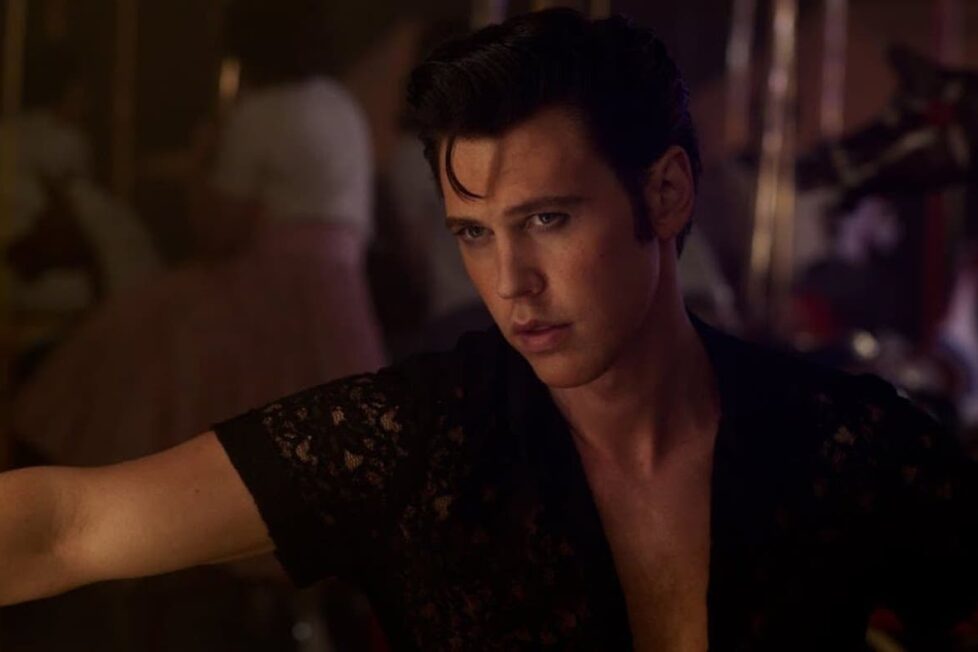
The life and career of music legend Elvis Presley, the King of Rock n' Roll.


Elvis is narrated by Colonel Tom Parker (Tom Hanks), Presley’s dictatorial manager and illegal Dutch immigrant, who is painted as a villain of the piece. He only ever sees the King of Rock n’ Roll as a cash cow, so milks him until he has nothing left to give. Elvis Presley (Austin Butler) is set up as a superhero, obsessed with Captain Marvel comic-books and saving his own family from poverty; while Parker’s the evil supervillain wandering around the casinos of his mind justifying his actions.
Director Baz Luhrmann (Romeo + Juliet) frames Parker as the twisted showman who made and broke Presley within 25 years. He created the Elvis myth and put his face on everything from pillows and dolls to suitcases, to work Elvis into an early death. He was also a smart businessman and clever promotor, using his years in the circus to successfully market the young performer before trapping him in the gilded cage of fame. He knew how to manipulate Elvis, using his love for performing and his worry about his family to keep him trapped.
Elvis has a traditional three-act structure, which is one of the few standard things about this film. Presley’s life is split into his 1953 introduction to the world and his early tour around local fairs, followed by the scandal of his black-influence rock n’ roll music and pelvic thrusting; the second part is dedicated to his 1968 comeback and ground-breaking TV special in a world shadowed by the death of Martin Luther King and Robert Kennedy’ and the film ends in the absurdist golden cage of Las Vegas in the 1970s where Elvis is now boated, overworked, and reliant on drugs.
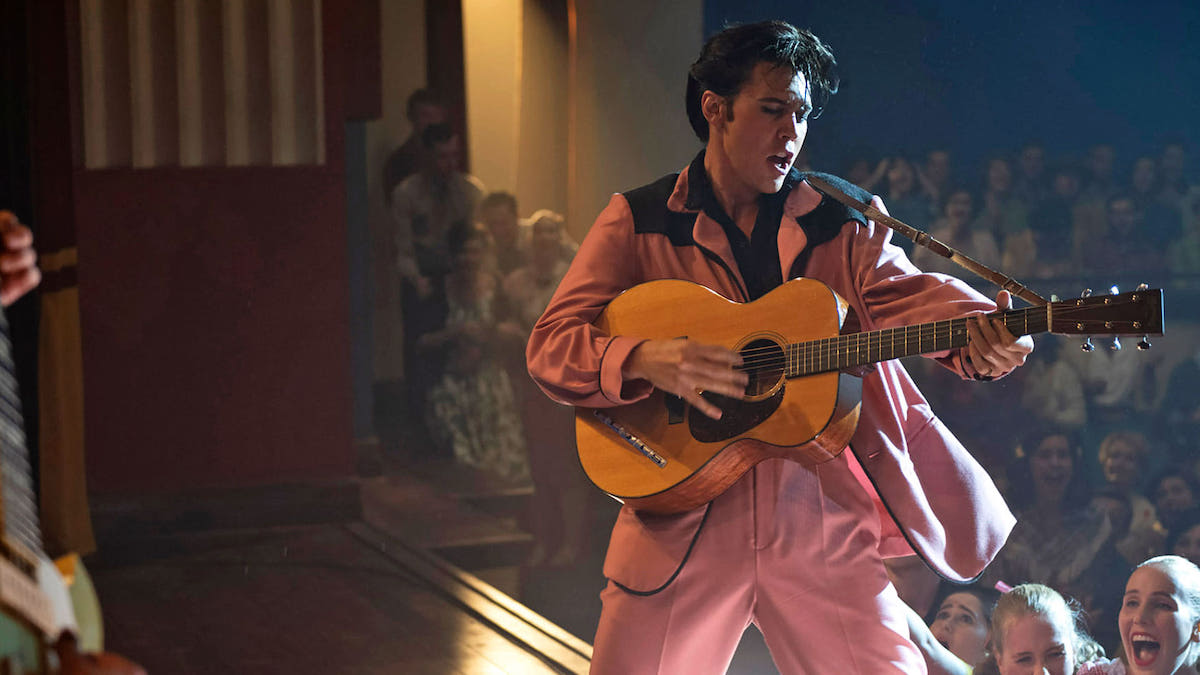
Butler’s transformation into the still-talented but broken superstar is the first Academy Award-worthy performance of the year. He fears he has done nothing of importance, and will be forgotten as he reaches his forties as a washed-up, failed actor. The ending is a poignantly sad tribute to a man who gave us so much and was treated so poorly. Elvis will make you mourn the loss of the extra three decades or more we should’ve had of the great man and his music. You really get the feeling Presley died not knowing how much he impacted so many.
Luhrmann uses the biopic formula to showcase how Elvis managed to cling to relevancy in an ever-changing world. He was endearing and never forgot who inspired him, even when the world wanted him to change. Despite Parker’s guidance, Elvis never forgets where he came from and chooses to follow his heart when it counts. It’s the rock n’ roll-inspired early days and the gospel-influenced later comeback years that live on, not the corny TV performances or tacky merchandise.
Presley’s life and career are far too long to fit the already bloated 159-minute film, so Luhrmann hops between the major moments. It quickly covers his military service and marriage to Priscilla Presley (Olivia DeJonge); the death of his beloved mother Gladys (Helen Thomson); and his relationships with the African American musicians such as B.B King (Kelvin Harrison Jr.) and Big Mama Thornton (Yola), who inspired his music. These snapshots into his life really help audiences understand the pure essence of the icon and how he cemented himself in history.
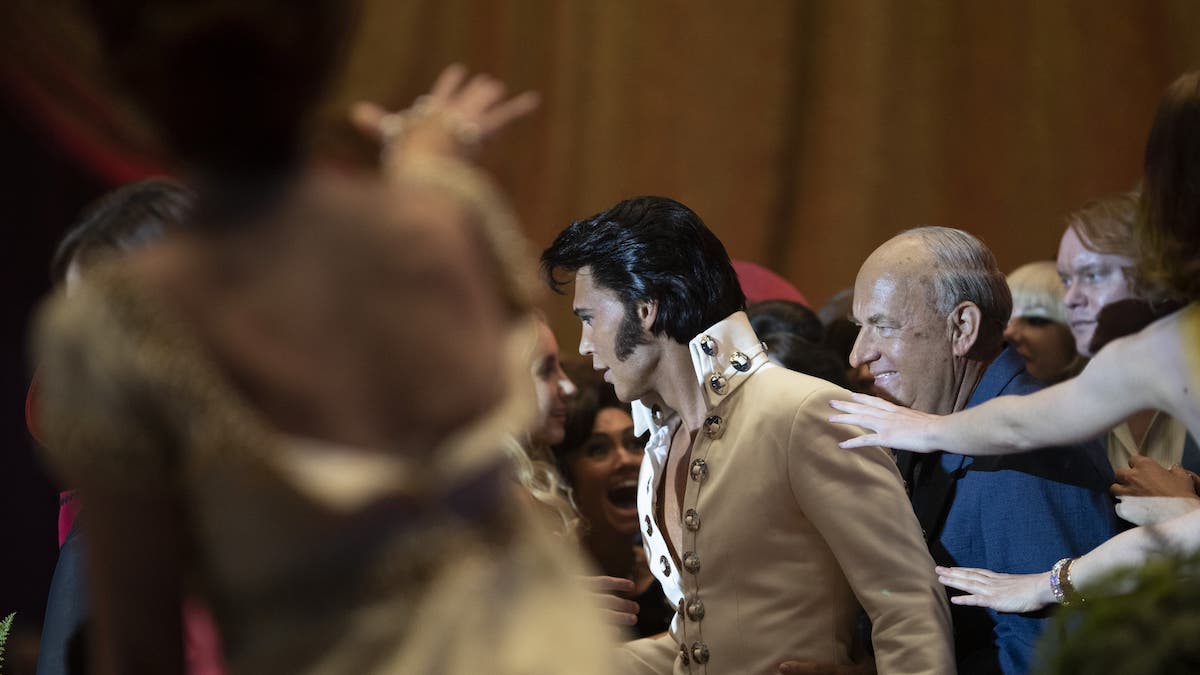
It may gloss over a lot of the difficult truths about Elvis Presley, canonizing him over giving us the hard facts, but you’ll find it hard to not be choked up by the climax. The fact he repackaged the gospel and blues culture he grew up with to make money is perhaps depicted much more positively than many would like (A lyric of Public Enemy’s “Fight the Power” disparages him) and his age difference with Priscilla whitewashed. It doesn’t ignore his final years, the anger, the drugs, and the affairs… but it’s perhaps a one-sided take on his life. Elvis never lies about the great man, but it does choose to ignore certain aspects of him.
Elvis won’t really tell you anything more than you already know about Presley either. It’s not an in-depth look at his psyche or his ground-breaking career. It is, however, an ode to African American culture and its impact on current pop culture. It is also a snapshot of a certain period of the US where MLK was shot and segregation was in full swing, yet the kids wanted more rock n’ roll music.
The soundtrack mixes the old and the new in a way many directors can’t get away with. The original Big Mama Thornton song “Hound Dog” gets spliced with Doja Cat, for example, to showcase the way African American musicians are still being exploited. Everyone wants to listen to the style of music they make, and everyone wants to copy the look and the dance moves but no one gives them the dues they deserve.
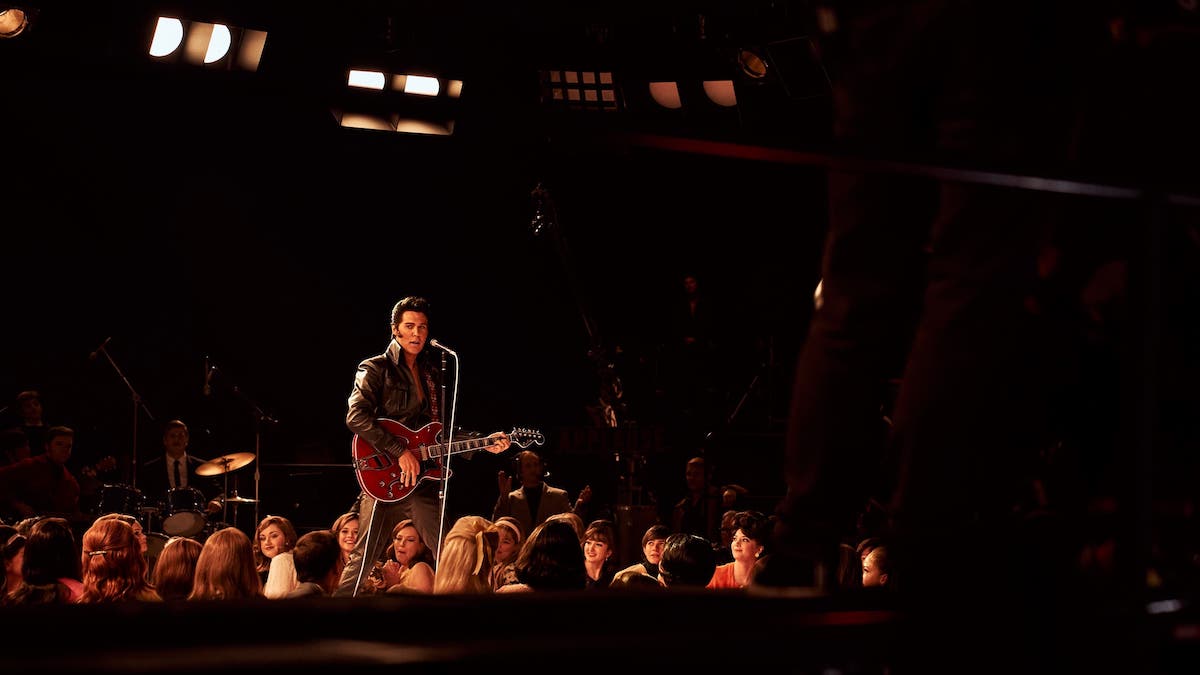
The soundtrack also noticeably features a mash-up of “Viva Las Vegas” with Britney’s “Toxic” and Backstreet Boys’ “I Want it That Way”. Both artists’ careers were impeded by managers not looking out for their best interests. Britney noticeably by her father, and the Backstreet Boys by Lou Pearlman—who was imprisoned for 25 years after pleading guilty to conspiracy, money laundering, and making false statements during a bankruptcy proceeding.
Austin Butler is a marvel as Elvis. Not just looking and sounding exactly like the superstar but embodying the confidence in his abilities and the bafflement at all the screaming girls in the audience. From his early days playing the Louisiana Hayride, Presley was a star. With a simple wiggle of the hips, the world fell at his feet, and Butler slips completely into the role, mimicking Elvis without it becoming a parody. The makeup, hair, and costume teams seamlessly help Butler grow as the years go by. This is showcased in the final moment where real footage of the singer is shown. Even Elvis aficionados may forget they’re not watching the real thing.
Alas, there’s a slightly baffling performance from Tom Hanks, hidden under pounds of latex and a swollen prosthetic nose. His unusual Dutch accent drifts throughout the movie, too. However, a weak and cartoonish Hanks performance is still better than most of his peers, but he’s outclassed here by Butler, a young actor who’s hitherto spent most of his career on lesser-known CW shows.
Luhrmann manages to just about skip the Walk Hard (2007) musician biopic cliches. Thanks to an innovative soundtrack, smart director and a fantastic cast, Elvis toes the line between a fantastical musical like Rocketman and a dry Bohemian Rhapsody (2018) music biopic. He plays around with genres and styles, dabbling in animation, 1960’s Brady Bunch-inspired montages, and dream sequences. The third act is perhaps bloated, but you’ll be so enveloped in this world you won’t mind spending a bit much time with Butler’s version of The King.
Elvis is everything you could want from a Luhrmann-directed biopic about the tragic life and death of this music legend. It’s messy, bloated and chaotic, which perfectly parallels the life of the icon. With a star-making turn from Austin Butler and a tear-jerking final act, Elvis will certainly leave a lasting impact on audiences.
AUSTRALIA • USA | 2022 | 159 MINUTES | 2.39:1 | COLOUR | ENGLISH

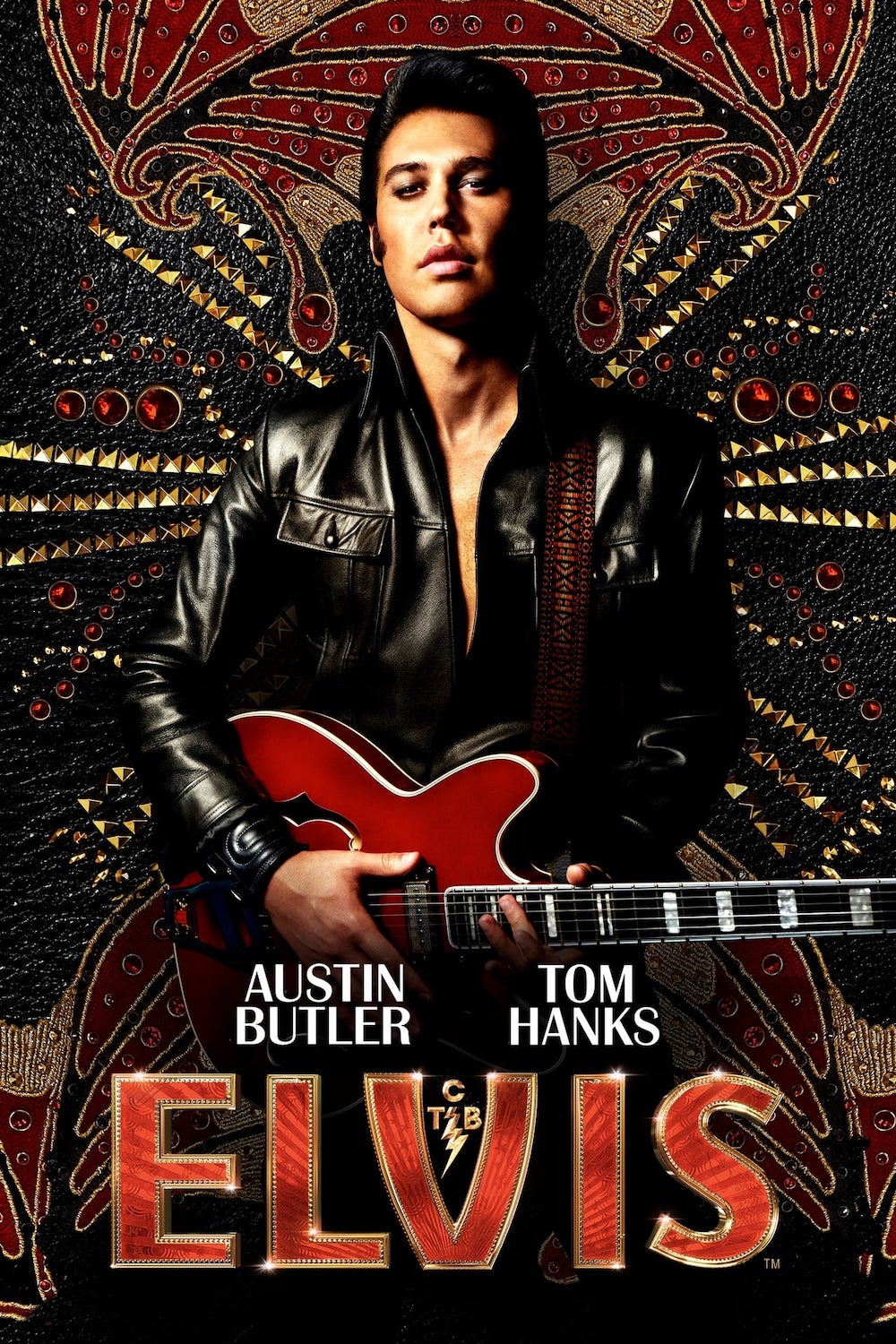
director: Baz Luhrmann.
writers: Baz Luhrmann, Sam Bromell, Craig Pearce & Jeremy Doner (story by Baz Luhrmann & Jeremy Doner).
starring: Austin Butler, Tom Hanks, Olivia DeJonge, Helen Thomson, Richard Roxburgh, Kelvin Harrison Jr., Xavier Samuel, David Wenham, Kodi Smit-McPhee, Luke Bracey, Dacre Montgomery, Leon Ford & Alton Mason.
